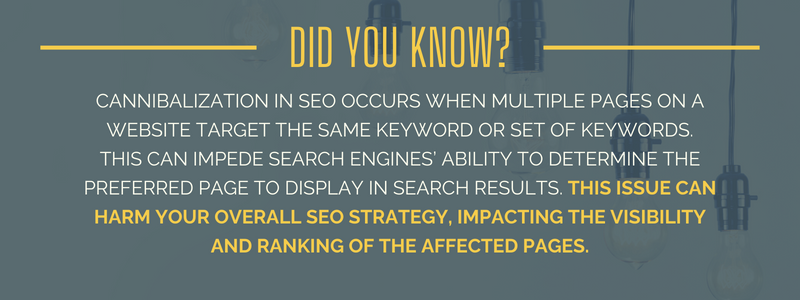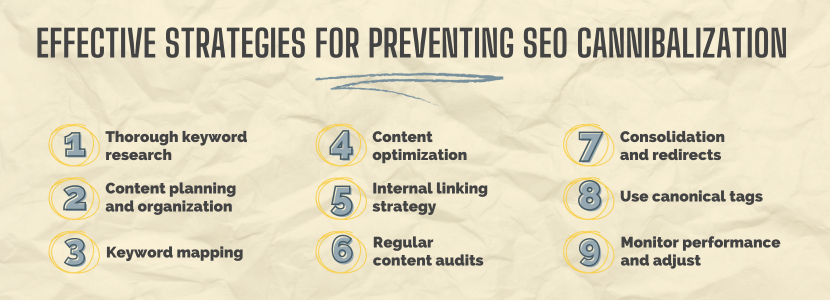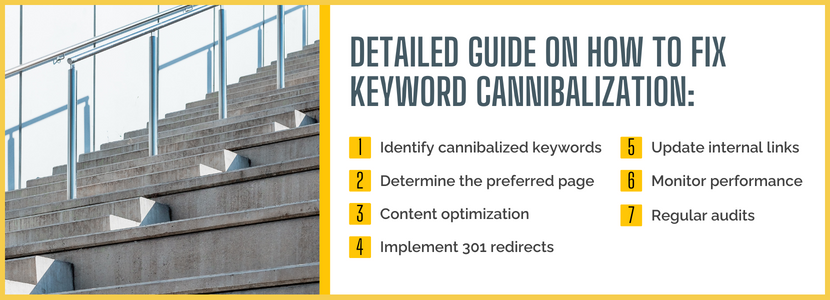What is SEO keyword cannibalization?

Cannibalization in SEO occurs when multiple pages on a website target the same keyword or set of keywords. This can impede search engines’ ability to determine the preferred page to display in search results. This issue can harm your overall SEO strategy, impacting the visibility and ranking of the affected pages.
SEO cannibalization is a significant challenge that digital marketers and website owners face in their quest for higher search engine rankings.
In this article, we will delve into the reasons why SEO keyword cannibalization is harmful, explore how to identify keyword cannibalization issues, discuss whether keyword cannibalization is always detrimental, highlight common mistakes to avoid when attempting to resolve the problem, and provide practical tips on how to prevent keyword cannibalization for a more effective digital marketing strategy.
Terms to know about
Click-through rates (CTR)- Click-through rate (CTR) is a metric that measures the percentage of people who click on a specific link or ad out of the total number of individuals who view it.
Search intent– Search intent is the purpose or goal behind a user’s online search, indicating the type of information or action they seek.
Conversion funnel– A conversion funnel is a step-by-step process that represents the stages a user goes through from initial interaction with a website or product to the desired outcome, typically a conversion or purchase.
Long-tail keywords– Long-tail keywords are specific and detailed search phrases, typically consisting of three or more words, used to target niche audiences and capture more specific search queries.
Keyword mapping– Keyword mapping is the strategic process of assigning and organizing target keywords to specific pages on a website, aligning content with user search intent, and optimizing for search engine visibility.
Internal linking strategy– An internal linking strategy involves strategically connecting and directing links within a website, enhancing navigation, distributing page authority, and optimizing the user experience for improved SEO.
301 redirects– 301 redirects are a server instruction that permanently redirects one URL to another, informing both users and search engines that the original page has been moved or replaced.
Canonical tags– Canonical tags are HTML elements used to indicate the preferred version of a webpage with similar or duplicate content, helping search engines consolidate ranking signals and avoid duplicate content issues.
Keyword hierarchy– Keyword hierarchy involves prioritizing and organizing keywords based on their importance and relevance, establishing a structured approach for targeted content creation and SEO optimization.
Key takeaways
- Blog posts benefit from unique keywords, preventing overlap and establishing authority on specific topics.
- Each page should have a clear purpose, ensuring focused content without unnecessary duplication.
- Keywords should be prioritized across pages based on relevance and intent, creating a structured approach.
- Craft individual, high-quality content for each page, optimizing it around specific keywords.
- Internal links should guide users and search engines logically, avoiding excessive connections between competing pages.
- Regular content audits help identify and address potential instances of SEO cannibalization.
- Explore merging multiple pages targeting the same keyword into a single authoritative page.
- Canonical tags serve to indicate the preferred content version, assisting search engines in prioritizing pages.
- Ensure each page serves distinct user intents to prevent redundancy in content.
- Consistent monitoring of performance metrics allows for addressing emerging cannibalization SEO issues and refining strategies based on data.
Why is SEO cannibalization harmful?
Cannibalization in SEO is harmful due to its adverse effects on a website’s search engine optimization efforts. When multiple pages within a website target the same keyword or set of keywords, they create internal competition for search engine rankings. The harmful consequences can be broken down into several key aspects:
Keyword dilution
Each page targeting the same keyword contributes to the dilution of the overall keyword strength. Instead of consolidating authority around a specific topic or query, the collective impact of individual pages is dispersed. This results in none of the pages ranking as well as they could if the focus were concentrated on a single, authoritative piece of content.
 Confusing search engines
Confusing search engines
Search engines aim to deliver the most relevant and valuable results to users. When multiple pages vie for the same keyword, search algorithms may struggle to determine which page is the most relevant for a specific search query. This confusion can lead to unpredictable rankings and a reduced likelihood of any of the pages securing a prominent position in search results.
Reduced click-through rates (CTR)
Users typically click on the top results in search engine listings. When a website’s pages compete against each other for the same keyword, it’s possible that none will rank high enough to attract clicks and more traffic. This diminished visibility can result in lower click-through rates, negatively impacting the organic traffic that the site receives.
Suboptimal user experience
Search intent is a crucial factor in delivering a positive user experience. When search engines struggle to identify the most relevant page for a particular query due to keyword cannibalization in SEO, users may encounter content that does not align with their expectations. This mismatch can lead to frustration and a diminished perception of the website’s overall quality.
Impact on conversion rates
For websites focused on sales, such as e-commerce platforms, the negative impact of SEO cannibalization extends to the conversion funnel. If users are unable to find the most relevant page quickly, they may abandon the site or choose competitors, resulting in lost opportunities for conversions and revenue.
Inefficient use of resources
SEO efforts, including content creation, optimization, and link-building, require time and resources. When these efforts are spread across multiple pages targeting the same keyword, it becomes an inefficient use of resources. Consolidating efforts around a single, authoritative page can yield better results and improve the overall return on investment.
How to avoid keyword cannibalization in SEO
Avoiding keyword cannibalization is crucial for maintaining a coherent and effective SEO strategy. Here’s a detailed guide on how to prevent keyword cannibalization:

Thorough keyword research
Conduct comprehensive keyword research to understand the landscape of your industry or niche, focusing on preventing cannibalization in SEO. Identify a broad range of relevant keywords, including variations and long-tail keywords. This step is crucial for building a robust foundation for your content.
Content planning and organization
Develop a clear content strategy with a cannibalization SEO lens, outlining the purpose of each page on your website. Clearly define the unique focus and target keywords for each page. This strategic planning ensures that your content serves specific user intents without unnecessary overlap.
Keyword mapping
Assign specific keywords to individual web pages, based on relevance and intent. Utilize primary and secondary keywords to differentiate the focus of each page. Avoid assigning the same primary keyword to multiple pages, as this can lead to confusion for search engines.
Content optimization
Craft high-quality, unique content for each page, optimizing it around the targeted keywords. Avoid duplicating content across pages, and ensure that each piece of content provides valuable and distinct information. This not only prevents cannibalization but also enhances the overall user experience.
Internal linking strategy
Implement a thoughtful internal linking strategy that guides users and search engines to related content without causing keyword overlap. Use descriptive anchor text and avoid excessive internal links between two pages targeting the same keyword. The goal is to create a logical and user-friendly content structure.
Regular content audits
Conduct regular content audits with a cannibalization SEO focus to identify potential instances of keyword overlap. Review each page to ensure that it fulfills a unique purpose and targets specific keywords. Update and optimize content as necessary, keeping it relevant and aligned with your SEO strategy.
Consolidation and redirects
If you discover multiple pages targeting the same keyword, consider consolidating them into a single, comprehensive page. This authoritative page can then be optimized to rank for the target keyword. Implement 301 redirects from redundant pages to the preferred, consolidated page to consolidate ranking signals and avoid confusion.
Use canonical tags
When dealing with similar pages or duplicate content across different URLs, use canonical tags to indicate the preferred version of the content. Canonical tags help search engines understand which page should be prioritized in search results, mitigating the risk of keyword cannibalization.
Monitor performance and adjust
Regularly monitor the performance of your pages with a cannibalization SEO perspective, assessing search engine rankings, traffic, and user engagement metrics. Analyze changes in rankings and user behavior to identify any emerging keyword cannibalization issues. Adjust your strategy as needed, keeping your content and SEO efforts aligned with evolving search engine algorithms and user expectations.
By following these detailed steps, you can proactively structure your website’s content and optimize your SEO strategy to minimize the risk of keyword cannibalization. This approach not only enhances search engine visibility but also contributes to a seamless and user-friendly online experience.
How to identify keyword cannibalization
Identifying keyword cannibalization is a crucial step in maintaining a focused and effective SEO strategy. The following guide on how to identify instances of where keyword cannibalization occurs on your website:
Review keyword mapping
Begin by revisiting your keyword mapping strategy. This involves looking at the keywords assigned to each page on your website. Check for instances where multiple pages are targeting the same primary or secondary keyword. A comprehensive and organized keyword strategy, as well as a keyword mapping document is invaluable for this analysis.
Conduct manual searches
Conduct manual searches on popular search engines using your target keywords with a cannibalization SEO viewpoint. Observe which pages from your site appear in the same search query results. If you notice that multiple pages are consistently ranking for the same keyword, it could indicate potential cannibalization.
Utilize SEO tools to prevent SEO cannibalization
Take advantage of SEO tools like SEMrush, Ahrefs, or Moz to conduct a thorough analysis of your website’s keywords and rankings. These tools provide insights into keyword positions, search volumes, and the pages that rank for specific keywords. Looking for overlapping keywords and identifying keyword cannibalization in pages that compete for the same search terms will aid in preventing cannibalization in SEO.
Analyze search console data
Use Google Search Console to gain deeper insights into your website’s keyword performance. In the “Search Analytics” section, review data on impressions, clicks, and average positions for different pages and keywords. Identify patterns where multiple pages rank for the same keyword and assess the overall performance.
Compare landing page
Conduct a detailed comparison of landing pages that target similar or identical keywords. Examine the content, titles, meta descriptions, and headers of these pages. Look for similarities and overlaps in the themes of the content. Identifying content similarities is crucial in understanding if cannibalization is occurring.
Examine traffic patterns
Analyze your website’s traffic patterns, particularly for pages targeting the same keyword. Look for inconsistencies or fluctuations in traffic to these pages. Significant differences in traffic trends may indicate that some pages are cannibalizing the traffic of others.
Use keyword mapping tools
Consider employing keyword mapping tools or creating a spreadsheet to visualize and track keyword assignments to different pages. Such tools can help you identify overlaps and inconsistencies in your keyword targeting strategy, making it easier to address cannibalization.
Evaluate user intent
Assess whether the content on different pages with similar keywords aligns with distinct user intents. Each page should ideally fulfill different user needs or provide unique perspectives on the topic. Ensuring that the page’s content serves diverse user intents can help mitigate cannibalization.
By meticulously implementing these steps focused on identifying keyword cannibalization, you can effectively pinpoint instances on your website. This awareness is crucial for taking corrective actions, optimizing your content strategy, and ensuring that each page contributes positively to your overall SEO efforts.
How to fix keyword cannibalization issues
Addressing keyword cannibalization issues requires a step-by-step and strategic approach to optimize your website’s content and ensure a cohesive SEO strategy. Here’s a detailed guide on how to fix keyword cannibalization:

- Identify cannibalized keywords: Begin by conducting a thorough analysis to identify instances of keyword cannibalization. Use SEO tools such as SEMrush, Ahrefs, or Google Search Console, and manually review your website’s content to pinpoint keywords that are targeted by multiple pages.
- Determine the preferred page: For each cannibalized keyword, decide on the preferred or authoritative page. Consider factors such as the overall SEO strategy, content quality, and relevance to the target keyword. Choose the page that best aligns with your goals.
- Content optimization: Optimize the content on each page to ensure it comprehensively covers the target keyword. Update titles, meta descriptions, headers, and body content to emphasize the chosen keyword. Enhance the overall quality and relevance of the content.
- Implement 301 redirects: Redirect traffic from cannibalizing pages to the preferred page using 301 redirects. This not only consolidates ranking signals but also ensures that users and search engines are directed to the most relevant and authoritative content.
- Update internal links: Review and update your website’s internal linking structure. Adjust anchor text to guide users and search engines to the preferred page for the target keyword. Remove or modify excessive internal links pointing to cannibalizing pages.
- Monitor performance: Keep a close eye on the performance of the preferred pages after implementing fixes. Monitor keyword rankings, organic traffic, and user engagement metrics to ensure that the changes positively impact your SEO efforts.
- Regular audits: Conduct regular content audits to identify and address new instances of potential keyword cannibalization. As your website evolves, new pages may unintentionally target the same keywords. Regular audits help maintain a clean and optimized content structure.
Is keyword cannibalization always bad?
Keyword cannibalization isn’t always inherently bad; its impact can vary based on the website’s goals, content strategy, and the intent behind targeting similar keywords across multiple pages. Here’s a nuanced perspective:
Instances where keyword cannibalization might not be detrimental
- E-commerce and large websites
For e-commerce platforms or large websites with a diverse range of products or services, targeting the same keyword across multiple pages might be intentional. This strategy aims to capture a broader set of search queries, offering users various entry points into the website’s offerings. - Different search intent
If the pages targeting the same keyword cater to different search intents or provide unique angles or information, it might not necessarily harm the user experience. For instance, one page might focus on product descriptions, while another offers in-depth guides or comparison content. - Dominating search results
In some cases, having multiple pages ranking for the same keyword can help dominate the search engine results page (SERP), occupying more real estate and increasing the website’s visibility. This is only for those websites with high domain authority.
What NOT to do to fix keyword cannibalization
While addressing a keyword cannibalization issue, it’s important to avoid certain pitfalls and common mistakes that could potentially worsen the situation or lead to unintended consequences. Here’s a list of what not to do when fixing keyword cannibalization issues:
- Deleting pages unnecessarily: Avoid hastily deleting pages that compete for the same keywords without a proper strategy. Removing pages abruptly can lead to a loss of valuable content, backlinks, and potentially harm the user experience.
- Keyword stuffing or over-optimization: Refrain from using keywords excessively (keyword “stuffing”). Over-optimization can lead to unnatural and poor-quality content, negatively impacting user experience and risking penalties from search engines.
- Ignoring user intent: Don’t overlook the importance of aligning content with user intent. Focusing solely on keyword optimization without considering user needs and intent can lead to content that doesn’t resonate with or provide value to users.
- Neglecting comprehensive content updates: Simply redirecting or consolidating pages without improving the content on the preferred page is a mistake. Ensure that the chosen page offers comprehensive and high-quality information that satisfies user queries better than competing pages.
- Skipping proper redirects: Remember to implement proper 301 redirects from cannibalizing pages to the preferred page. Incorrect or missing redirects can lead to broken links, a poor user experience, and loss of search engine rankings.
- Neglecting internal linking: Neglecting to update internal linking structures after fixing keyword cannibalization can perpetuate confusion. Ensure that internal links guide users and search engines to the preferred page, avoiding excessive links to other competing pages.
- Avoiding regular monitoring and updates: Don’t overlook the importance of ongoing monitoring and updates. Ignoring regular checks for new instances of keyword cannibalization or failing to adjust strategies based on performance changes can lead to recurring issues.
- By avoiding these pitfalls and taking a holistic approach that focuses on enhancing content quality, addressing user intent, and maintaining a coherent site structure, you can effectively mitigate keyword cannibalization issues without compromising the overall user experience or SEO performance.
Let Take the Stairs fight cannibalization for you!
 Let Take the Stairs (TTS) be your guide in the battle against keyword cannibalization! Our tailored strategies ensure that your content hierarchy remains strong, keywords are strategically placed, and your pages shine individually.
Let Take the Stairs (TTS) be your guide in the battle against keyword cannibalization! Our tailored strategies ensure that your content hierarchy remains strong, keywords are strategically placed, and your pages shine individually.
Elevate your SEO game today and prevent cannibalization with TTS by your side. Contact us for a customized solution that keeps your content climbing to the top of search engine rankings!





